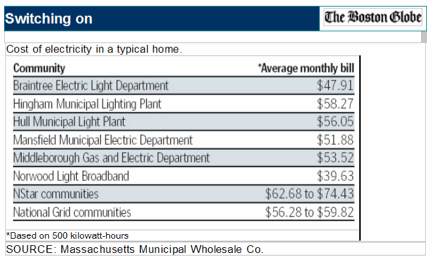Towns weigh taking power into their own hands
Local light plants gaining favor
By Matt Carroll, Globe Staff | January 8, 2006
Town officials, fed up with soaring electric rates charged by utility companies, are exploring the possibility of starting their own electric companies in order to save money.
At least 17 communities in the region and 110 statewide are backing a bill before the Legislature that would ease rules for starting a municipal light plant, according to the Massachusetts Alliance for Municipal Electric Choice, which is supporting the legislation.
Rates for municipal electric companies -- or ''munis" as they are sometimes called -- generally provide electricity at lower costs than do private companies. Just how much cheaper varies by community.
On average, municipals are 24 percent cheaper for residents, and about 10 percent less for commercial customers, according to Patrick Mehr, statewide coordinator for the program.
The state's two largest electric utilities -- NStar and National Grid, until this fall known as Massachusetts Electric -- adamantly oppose the legislation. They acknowledge they cost more than the town departments, but say it's because they have additional costs, such as property taxes paid to towns. The utilities also said they provide help for the poor, and energy-efficiency programs that may not be offered by municipal departments.
''We're trying to protect our customers," said Caroline Allen of NStar.
Six communities in the region already have municipal light departments -- Braintree, Hingham, Hull, Mansfield, Middleborough, and Norwood. No new municipal departments have opened, however, since the 1920s. There are 40 statewide.
The current state law on municipals makes it impractical to start a new one, Mehr said. The new law would state that once a fair-market value has been established for a public utility's infrastructure, the sale must occur, and that a process must be established to review the economics of the new muni. No more than three could be created a year.
Even if the legislation passes, no new companies would spring up overnight. The process for creating a municipal light department is lengthy and expensive. For instance, a community would have to pay the utility company serving the community for all of its poles and wires.

But community leaders -- with one eye on soaring electric bills and the other on tighter, leaner town budgets -- still want the bill passed because it gives them greater financial flexibility in the future, even if they have no immediate plans to make the switch.
Allowing communities to create their own light companies would foster competition with the big utilities, which would be good for ratepayers, said Carver's town administrator, Richard J. LaFond.
''There's no other options available for most ratepayers and cities and towns, and it doesn't seem fair," he said. In fiscal 2005, Carver spent $445,000 to light town buildings and the schools. This year, it should be about 3 percent higher, he said.
In Bridgewater, Municipal Administrator Paul Sullivan said the selectmen favor the bill, even if they aren't seriously thinking of starting their own electric department -- yet.
''But, if the option is there at some future point in time, we might embark on it," Sullivan said. ''No one is happy with rates."
Plymouth officials are studying a number of options, including setting up their own electric department, said Jim Sweeney, chairman of the town's Energy Committee.
Another possibility might be to construct 40 350-foot wind towers, which would not only generate enough energy for the town but create enough to sell, he said.
NStar and National Grid dominate the state. The two serve nearly 250 communities and 2.4 million customers. Both utilities recently announced price increases that ranged from 25 percent to 34 percent.
Regionally, electric rates vary widely. For instance, in 2004, the monthly electric cost for an average-size house in Braintree that used 500 kilowatt-hours would have been $47.91; in Middleborough, $53.52; and in Mansfield, $51.88. Each of those three towns has its own municipal electric company.
By contrast, rates charged by NStar ranged from $62.68 to $74.43. Rates for Mass. Electric, now National Grid, varied from $59.82 to $56.28.
Spokesmen for both NStar and National Grid said that not only is the municipal electric legislation flawed, they are concerned about getting fair-market value for facilities and equipment in towns that start their own departments.
Mehr, the statewide coordinator for the group pushing House bill 3294, said municipal departments would have to deliver the same services as the major utilities.
And while they don't pay taxes, they do make payments in lieu of taxes that are often more than property taxes, he said.
Mehr said the local communities backing the legislation are Bridgewater, Brockton, Canton, Carver, Easton, Foxborough, Freetown, Hanover, Marion, Milton, Plymouth, Rockland, Scituate, Sharon, Walpole, Wareham, and Weymouth.
He said the bill also is backed by 40 legislators.
Matt Carroll can be reached at mcarroll@globe.com.
